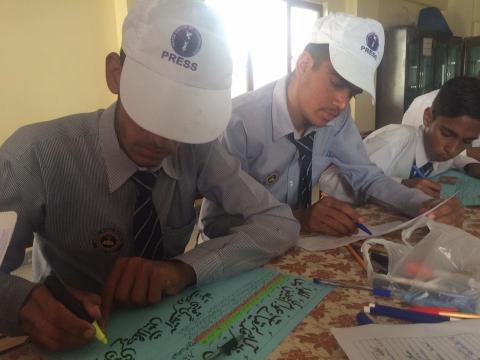By URI Peace Group of Journalists (URI Kashmir) CC
Muzaffarbad, 5th June 2011
Peace Group of Journalists (URI Kashmir) has called upon all stakeholders, including the government to make a collective effort towards implementing the UN 1997 Kyoto Protocol on the environment. The UN has declared 2011 the World Year of the Forests. At the time of independence, Pakistan had 25% forest cover, but according to statistics this has fallen below 2.5% landmass with forest cover. The 2010 historic flood that devastated Pakistan and the State of Kashmir, leaving behind a trail of destruction affecting 21 million, is largely attributed to deforestation by the timber mafia. It is therefore critical for Pakistan and State of Kashmir to protect the forests before they disappear altogether with serious consequences. Both the urban and rural landscape of Pakistan and Kashmir is being denuded of biodiversity and natural heritage, as the “greed for more” has overtaken concerns like sustainability. Water, a life sustaining resource is fast depleting, and it is feared that by 2020, Pakistan will turn into a “water depleted” country with irreversible socioeconomic consequences.
Few countries with a positive environmental profile embrace the culture of citizenship while Pakistan follows the casual relationship with its citizens. Its policies are therefore detrimental to the interests of larger population and cater to the elitist model of development. Pakistan falls under this category where decisions are arbitrary and rarely democratic. Development should be people- centered. Therefore, the paradigm of development has to be redefined. The people of Kashmir need a well planned public transport system like mass transit and environmental friendly buses, and not mega projects, like flyovers, which are a huge investment and only benefit elites (in form of kickbacks and contracts) as well as its usage (the small percentage with SUVs and expensive vehicles). This is not cost effective, participatory, equitable nor democratic. Thus public revenues are diverted towards the “uglification” and not beautification of cities, as is happening all over Kashmir. What are the needs of the people? It’s their happiness and social justice. Water and sanitation, education, a healthy lifestyle and the environment should be the priority where citizens are central to decision making. Exotic plants like palms destroy biodiversity, dry up natural aquifers and hence lead to desertification of soil. Similarly, large trees provide relief to humans as well as animals. They also provide shade, moisture, oxygen and fight pollution. Cutting old trees is contributing to pollution as well as heat. We are doing this all over Pakistan, and Kashmir is no exception.
According to the Peace Group of Journalists, “a mature leafy tree produces as much oxygen in a season as 10 people inhale in a year.” Here are some other quoted figures regarding the amount of oxygen produced by a tree: “A single mature tree can absorb carbon dioxide at a rate of 48 lbs/year and release enough oxygen back into the atmosphere to support two humans.” “One acre of trees annually consumes the amount of carbon dioxide equivalent to that produced by driving an average car for 26,000 miles. That same acre of trees also produces enough oxygen for 18 people to breathe for a year. A 100-ft tree, 18” diameter at its base, produces 6,000 pounds of oxygen” [New York Times].
Peace Group of Journalists ®
Muzaffarbad State of Kashmir, Pakistan

